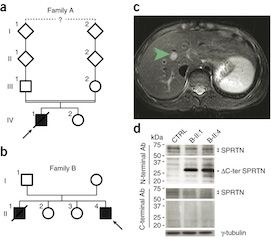29 Sep 2014 - Revealing the cause of early onset liver cancer
A multidisciplinary, international team led by C. Kubisch (Ulm University), K. Ramadan (Oxford University), J. Terzic (Split University), D. Amor (University of Melbourne) and I. Dikic (Goethe University in Frankfurt) reports in today's online issue of Nature Genetics the discovery of a hitherto unknown mutation causing early onset liver cancer.
Individuals carrying this mutation are highly likely to develop liver cancer during childhood, and also show multiple signs of premature aging. The mutation disrupts the function of a gene called SPRTN, resulting in accumulation of DNA damage during each cell division and subsequent chromosome instability.
Ivan Dikic comments: "This is an excellent example of success of long term projects. It started more than 7 years ago, at the time focusing on Ub-dependent DNA repair pathways. Later, by serendipity, the results turned out to be critical for understanding the development of hepatocarcinoma. The project has attracted several collaborators around the world and only by closely collaborating we were able to successfully accomplish this task. It also shows why a certain stamina on the side of fund providers (7 years without a single publication) is essential for addressing big and important questions in biomedicine."
